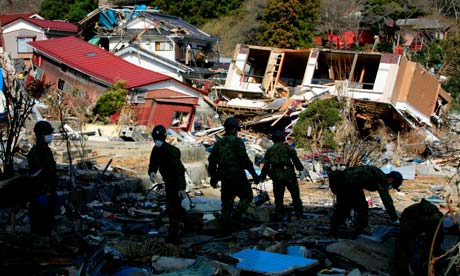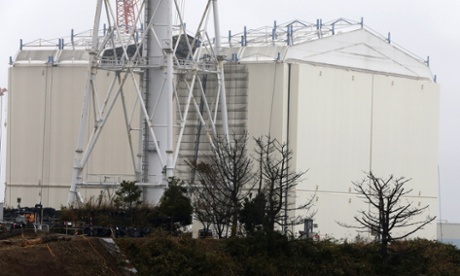The search is continuing for victims of the tsunami that struck Japan's north-east coast almost a month ago, while officials said they hoped to stop pumping radioactive water from the Fukushima Daiichi nuclear plant into the sea.
More than 20,000 Japanese troops and 110 from the US conducted land, sea and air searches for the thousands of victims whose bodies have yet to be recovered.
One month since the 11 March disaster, fewer than 13,000 of the estimated 28,000 who died have been found. The likelihood of finding more is fading because many have probably been swept out to sea. A similar search last week recovered only 70 bodies.
On a visit to Ishinomaki, where 2,600 of the 163,000 residents were killed and 2,800 are still missing, the prime minister, Naoto Kan, vowed to support the city's recovery. About 17,000 people are still living in evacuation centres, while Ishinomaki's fishing industry, which accounts for 40% of the local economy, may never fully recover. "The government will do its best to help you," Kan said. "We will do everything we can to enable you to start fishing again."
The operation to stabilise the Fukushima plant, meanwhile, is about to enter its fifth week, with no end in sight to the world's worst nuclear crisis since the Chernobyl disaster in 1986.
Nuclear officials said they hoped to stop pumping contaminated water into the sea amid criticism from neighbouring China and South Korea, which have accused Tokyo of incompetence in its handling of the crisis.
Engineers said the buildup of radioactive water during recent attempts to cool Fukushima's overheating reactors left them with little choice but to pump it into the ocean, where it quickly dissipates.
The plant's operator, Tokyo Electric Power (Tepco), apologised for the nuclear crisis, which has prompted the evacuation of tens of thousands of people, contaminated local food and water supplies and caused panic as far away as Tokyo, 150 miles to the south. "I would like to offer my deepest apologies for the concern and trouble we are causing due to the release of radioactive materials into the atmosphere and water," Tepco's vice-president, Sakae Muto, said.
Workers have been struggling to dispose of 60,000 tonnes of radioactive water that have built up beneath some of the plant's six reactors. "We cannot say what the outlook is for the next stage," Hidehiko Nishiyama, the deputy director-general of Japan's nuclear and industrial safety agency, said. "As soon as possible, we would like to achieve stable cooling and set a course towards controlling radiation."
Nearby radiation levels in the sea have fallen in recent days, but pockets of high radiation have frustrated attempts to repair the reactors' cooling systems. On Thursday, workers had to evacuate the plant after a strong aftershock shook the region.











